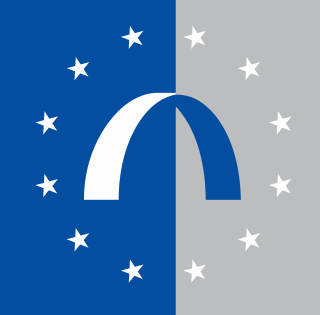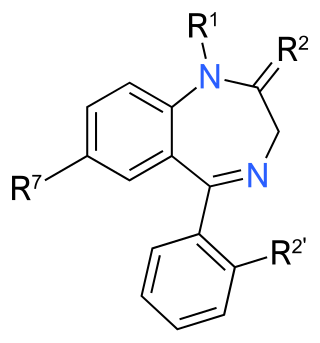Related Research Articles

Heroin, also known as diacetylmorphine and diamorphine among other names, is a morphinan opioid substance synthesized from the dried latex of the Papaver somniferum plant; it is mainly used as a recreational drug for its euphoric effects. Medical-grade diamorphine is used as a pure hydrochloride salt. Various white and brown powders sold illegally around the world as heroin are routinely diluted with cutting agents. Black tar heroin is a variable admixture of morphine derivatives—predominantly 6-MAM (6-monoacetylmorphine), which is the result of crude acetylation during clandestine production of street heroin. Heroin is used medically in several countries to relieve pain, such as during childbirth or a heart attack, as well as in opioid replacement therapy.

Harm reduction, or harm minimization, refers to a range of intentional practices and public health policies designed to lessen the negative social and/or physical consequences associated with various human behaviors, both legal and illegal. Harm reduction is used to decrease negative consequences of recreational drug use and sexual activity without requiring abstinence, recognizing that those unable or unwilling to stop can still make positive change to protect themselves and others.

A needle and syringe programme (NSP), also known as needle exchange program (NEP), is a social service that allows injecting drug users (IDUs) to obtain clean and unused hypodermic needles and associated paraphernalia at little or no cost. It is based on the philosophy of harm reduction that attempts to reduce the risk factors for blood-borne diseases such as HIV/AIDS and hepatitis.

Supervised injection sites (SIS) or drug consumption rooms (DCRs) are a health and social response to drug-related problems. They are fixed or mobile spaces where people who use drugs are provided with sterile drug use equipment and can use illicit drugs under the supervision of trained staff. They are usually located in areas where there is an open drug scene and where injecting in public places is common. The primary target group for DCR services are people who engage in risky drug use.
Commonly-cited arguments for and against the prohibition of drugs include the following:
Network Against Prohibition (NAP) is an Australian drug law reform activist group. It was organised on 7 March 2002, in Darwin, Northern Territory to response to the Australian Labor Party's drug house legislation. The organisations goal is to end prohibition of recreational drug use and draw attention to the human rights abuses faced by illicit drug advocates. The organisation provides a number of services, including needle exchanges, community smoke-ins, and an email newsletter. A number of NAP members were arrested for disturbing the Northern Territory's legislative assembly in 2002.

The European Monitoring Centre for Drugs and Drug Addiction (EMCDDA) is an agency of the European Union located in Lisbon, Portugal, and established in 1993. In June 2022, the Council of the European Union approved a reform of the organization which will lead to an extension of its mandate and a change of name for "European Union Drugs Agency."
The Australian Council For International Development (ACFID) is an independent national association of Australian non-government organisations (NGOs) working in the field of international aid and development. ACFID was founded in 1965, with Syd Einfeld as Chairman, and has over 130 members working in 90 developing countries and supported by over 1.5 million Australians. It lobbies for non-government aid organisations, and Australian government development aid.

Drug injection is a method of introducing a drug into the bloodstream via a hollow hypodermic needle, which is pierced through the skin into the body. Intravenous therapy, a form of drug injection, is universally practiced in modernized medical care. As of 2004, there were 13.2 million people worldwide who self-administered injection drugs outside of medical supervision, of which 22% are from developed countries.
The history of HIV/AIDS in Australia is distinctive, as Australian government bodies recognised and responded to the AIDS pandemic relatively swiftly, with the implementation of effective disease prevention and public health programs, such as needle and syringe programs (NSPs). As a result, despite significant numbers of at-risk group members contracting the virus in the early period following its discovery, Australia achieved and has maintained a low rate of HIV infection in comparison to the rest of the world.
Illicit drug use in Australia is the recreational use of prohibited drugs in Australia. Illicit drugs include illegal drugs, pharmaceutical drugs when used for non-medical purposes, and other substances used inappropriately. According to government and community organisations, the use and abuse, and the illegality, of illicit drugs is a social, health and legal issue that creates an annual illegal market estimated to be worth A$6.7 billion. Estimates made in 2022 place the figure at A$11.3 billion per year.

Benzodiazepine use disorder (BUD), also called misuse or abuse, is the use of benzodiazepines without a prescription and/or for recreational purposes, which poses risks of dependence, withdrawal and other long-term effects. Benzodiazepines are one of the more common prescription drugs used recreationally. When used recreationally benzodiazepines are usually administered orally but sometimes they are taken intranasally or intravenously. Recreational use produces effects similar to alcohol intoxication.
The drug policy of Portugal, informally called the "drug strategy", was put in place in 2000, and came into effect in July 2001. Its purpose was to reduce the number of new HIV/AIDS cases in the country, as it was estimated around half of new cases came from injection drug use.
Health Equity Matters, formerly the Australian Federation of AIDS Organisations (AFAO), is an Australian non-profit organisation that aims to end health inequity for its diverse communities, with HIV the core of its mission until the epidemic is over for everyone. To do this in Australia it brings together the leading HIV and LGBTIQA+ health organisations in each state and territory and other national member organisations representing communities affected by HIV, and leverage its relationships, expertise and advocacy to give them a unified voice to federal government on HIV and LGBTIQA+ health.
Australia has been at the forefront in the fight against doping in sport. It was one of the first countries to establish a sports anti-doping agency and is a member of World Anti-Doping Agency (WADA). Australia abides by World Anti-Doping Code. In 2010, Australian John Fahey was re-elected as President of WADA for a second and final three-year term which finished at the end of 2013. Australia like other major countries has been embroiled in major doping in sport controversies and issues.

Under Australia's law, methamphetamine is a Schedule 8 drug, available for medical use but restricted in manufacture, supply, and possession. The drug is sought after to give oneself a ‘high’ or a ‘rush’ in their body. Users of this drug often feel senses of exhilaration and arousal as the brain is flooded with monoamines. Methamphetamine has many names not only in Australia, but also around the world. These include chalk, crypto, gear, getgo, tweak, and cristy, although the two most common ones in Australia today are ice and shard. Speed refers to the powder form of the drug, while ice refers to the highly purified, crystalline form. The powder form is often diluted with adulterants including glucose and sucrose.
Discrimination against drug addicts is a form of discrimination against people who suffer from a drug addiction.

The Uniting Medically Supervised Injecting Centre Kings Cross is a state government-supported facility in Kings Cross, New South Wales that provides safe injecting rooms, sterile equipment and medical supervision for individuals who wish to administer an illicit drug intravenously.

Heroin is classified as an opioid drug produced from the opium poppy. The illicit use of heroin in Australia emerged during the 1960s throughout the Vietnam War. Its origins have been linked to American troops stationed in major cities such as Melbourne and Sydney, who introduced the drug to the red-light districts whilst on their recreational leave.
INPUD is an international non-profit organization grouping local groups and collectives of people who use illicit drugs, which aims at "A world where people who use drugs are free to live their lives with dignity." INPUD was founded in 2006 in Vancouver, Canada, and formally launched in Copenhagen, Denmark, on 1 November 2008.
References
- ↑ "Australian Injecting and Illicit Drug Users League (AIVL)". Edith Cowen University. Retrieved 5 January 2014.
- ↑ Greg Barns (14 May 2012). "Addicts have a right to be heart". Hobart Mercury.
- ↑ Menios Constantinou (22 September 2010). "Injecting centre to be made permanent". Wentworth Courier.
- ↑ Sean Parnell (17 October 2013). "'Complacency' sees risk of HIV spread EXCLUSIVE". The Australian.
- ↑ Fed: Worrying side effects attached to new party drug, Australian Associated Press, 29 January 2010